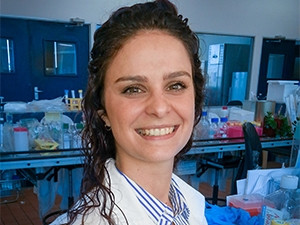
Dr Stephanie Fanucchi, a cell biologist at the Council for Scientific and Industrial Research (CSIR), who recently received the 2016 L'Or'eal-Unesco Sub-Saharan Africa Award, aims to encourage more young aspiring scientists in SA to pursue scientific careers in basic research.
Fanucchi was honoured for her work involving the use of cutting-edge microscopes and synthetic biology tools to understand how immune genes are regulated.
She beat competition from 49 countries to walk away with the award. For the past 18 years, the L'Or'eal-Unesco for Women in Science programme has encouraged, promoted and honoured women scientists all over the world.
In an interview with ITWeb, she said: "This award puts my work and the work we are doing in the lab on the world stage, and raises awareness of how important it is to conduct basic cell biology research. This will hopefully encourage more young aspiring scientists in SA to pursue scientific careers in basic research."
She pointed out it is such an honour and privilege to receive such a prestigious award. "Personally, this award shows me that the many years of hard work, and hundreds of failed experiments, paid off. Also, this award provides the much-needed encouragement to continue pursuing my career in scientific research.
"I am very grateful to the continued support from the Department of Science and Technology (DST) and CSIR that made this work possible."
According to Fanucchi, there is a gender imbalance in science, with only 30% of the world's researchers being women. "Also, only 3% of Nobel Prizes in scientific fields have been awarded to women. Therefore, science needs more women. These awards are so important, as they show young women that it is possible to pursue a career in science. Intelligence, curiosity and passion for science don't have a gender.
"I've come to realise that science is not about knowing facts, but rather science is about learning what the unknown questions are, and coming up with creative ways to solve these questions. I think the more diverse the team working on the problem, the more creative the solution can be."
She believes involving more female scientists is so important to enrich the diversity, creativity and insight of research teams.
Fanucchi, a senior researcher at the CSIR within the Biomedical Translational Research Initiative (BTRI) - an initiative of the CSIR and the University of Cape Town, funded by the DST, was a recipient of the L'Or'eal-Unesco Sub-Saharan Africa 2016 postdoctoral fellowship of EUR10 000.
The title of her project is "deciphering the roles of non-coding ribonucleic acids in immune gene regulation", which she conducts in BTRI technical manager professor Musa Mhlanga's laboratory.
"Aberrant gene regulation underpins a multitude of disease states, including autoimmune disease and cancer," says Fanucchi.
"Yet, despite this, our understanding of the intricacies of gene regulation remains poorly understood. Therefore, a detailed understanding of immune gene regulation will have far-reaching implications with respect to our understanding and treatment of cancer, chronic diseases such as diabetes, allergy responses and a host of other diseases and important cellular processes."
As part of the programme, 14 female scientists from across Sub-Saharan Africa have been honoured for their work and impact in the scientific field.
Share